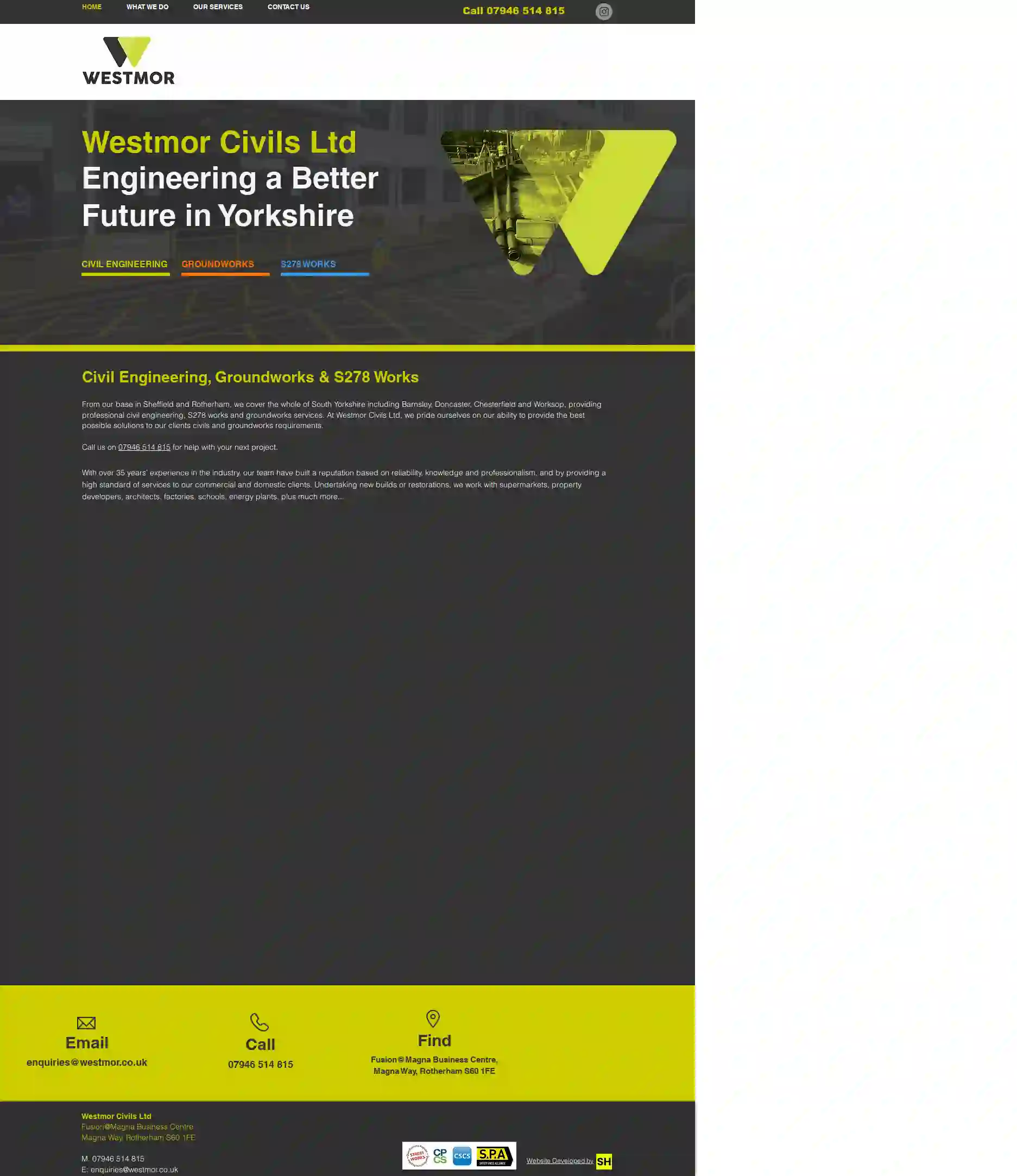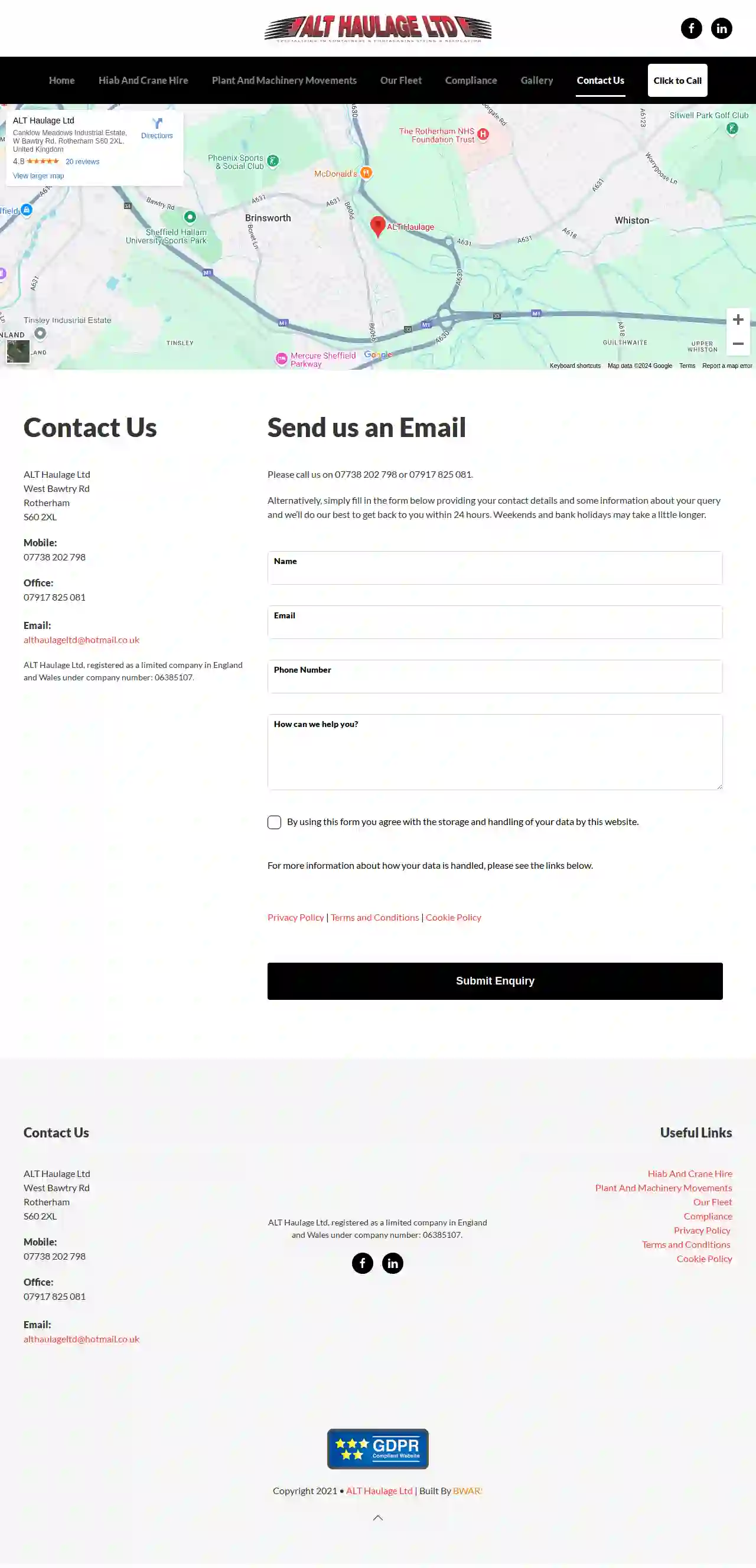Demolition Contractors Rotherham
Best Building Demolition in Rotherham
Get up to 3 Demolition Services quotes for your project today! Compare profiles, reviews, accreditations, portfolio, etc... and choose the best service.
- Sw
Swift Groundworks
32 reviewsRotherham, GB- Services
- Why Us?
Get Quote - MS
MSE Construction
52 reviewsRotherham, GB- Services
- Why Us?
Get Quote - K&
K&L Construction LTD
52 reviewsRotherham, GB- Services
- Why Us?
Get Quote 
Westmor Civils ltd
1Fusion@Magna Business Centre, Magna Way, Rotherham, Fusion@Magna Business Centre Magna Way, S60 1FE, GBEngineering a Better Future in Yorkshire From our base in Sheffield and Rotherham, we cover the whole of South Yorkshire including Barnsley, Doncaster, Chesterfield and Worksop, providing professional civil engineering, S278 works and groundworks services. At Westmor Civils Ltd, we pride ourselves on our ability to provide the best possible solutions to our clients civils and groundworks requirements. With over 35 years’ experience in the industry, our team have built a reputation based on reliability, knowledge and professionalism, and by providing a high standard of services to our commercial and domestic clients. Undertaking new builds or restorations, we work with supermarkets, property developers, architects, factories, schools, energy plants, plus much more...
- Services
- Why Us?
- Gallery
Get Quote- MA
MAP Services
4.26 reviewsRotherham, GB- Services
- Why Us?
Get Quote - Ro
Rotherham Mini Digger Hire
3.88 reviewsRotherham, GB- Services
- Why Us?
Get Quote 
ALT Haulage Ltd
4.820 reviewsWest Bawtry Rd, Rotherham, S60 2XL, GBAbout ALT Haulage ALT Haulage is a family-run business established in 2007. We provide a full range of haulage services throughout the UK & Internationally. Based in Rotherham, South Yorkshire, our number one aim is to provide a reliable, efficient, and professional service. All our drivers and crane operators have a number of years of experience. At ALT, we understand the importance of delivering goods to site in perfect condition and on time. We strive to provide this service and go the extra mile to ensure our customers are 100% satisfied. We believe that customer satisfaction is paramount to the success of ALT.
- Services
- Why Us?
- Accreditations
- Testimonials
- Gallery
Get Quote- En
Environmental Drainage Solutions Ltd
52 reviewsRotherham, GB- Services
- Why Us?
Get Quote - AC
AC Groundworks Driveway Specialist
4.620 reviewsRotherham, GB- Services
- Why Us?
Get Quote 
KB Paving & Landscaping
1Based in Rotherham, Rotherham, GBLandscape Gardeners in Sheffield, Rotherham and South Yorkshire Our landscape gardeners at KB Paving & Landscaping offer hard and soft landscaping services to residential clients across South Yorkshire. Guaranteed Landscaping Work Welcome to our new website. Based in Rotherham, KB Paving & Landscaping has been in business since 2015, offering domestic landscaping services to clients in Sheffield, Rotherham and the surrounding areas throughout South Yorkshire. These include hard landscaping services such as Indian sandstone paving, porcelain paving, new driveway installations, new fencing installations, garden gates, and, block paving. Our soft landscaping work covers lawn turfing and seeding, flower bed maintenance, garden clearances, tree planting, and hedge cutting. Customer Loyalty Schemes With almost two decades of experience as landscape gardeners, we understand the importance of providing a top-level service at all times, no matter what project we’re working on. We’re lucky to have a growing base of clients who rely on us regularly to maintain their gardens and outdoor spaces and who also take the time to recommend us to friends and family. We offer a customer loyalty scheme to these residential clients, making us a practical and financially rewarding choice.
- Services
- Why Us?
- Gallery
Get Quote
Over 11,537+ Excavation Contractors in our network
Our excavation companies operate in Rotherham & surrounding areas!
ExcavationHQ has curated and vetted Top Excavation Businesses arround Rotherham. Find a trustworthy business today.
Frequently Asked Questions About Demolition Contractors
- Dust Suppression: Use water spraying, misting systems, or other dust suppression techniques to control airborne particles.
- Noise Barriers: Erect temporary noise barriers around the demolition site to reduce noise transmission to nearby properties.
- Work Schedule: Schedule noisy demolition activities during permitted hours to minimize disturbance to neighbors.
- Communication: Keep neighbors informed about the demolition schedule and any potential disruptions.
- Recycling: Concrete, brick, metal, and wood can be recycled and reused in other construction projects, reducing waste sent to landfills.
- Landfill Disposal: Non-recyclable materials are disposed of in designated landfills according to local regulations.
- Donation: Some materials, such as fixtures or appliances, may be suitable for donation to charitable organizations.
- Waste Generation: Demolition generates a large volume of debris, contributing to landfill space and potentially releasing harmful substances into the environment if not disposed of properly.
- Air Pollution: Dust and particulate matter released during demolition can impact air quality, affecting human health and the environment.
- Noise Pollution: Demolition activities can generate significant noise, disturbing nearby residents and wildlife.
- Resource Depletion: Demolition consumes resources that could be salvaged and reused, contributing to resource depletion and environmental degradation.
What is the difference between demolition and deconstruction?
Demolition: Typically involves bringing down a structure quickly and efficiently, often using heavy machinery and potentially explosives. The primary goal is to clear the site.
Deconstruction: Focuses on carefully dismantling a building piece by piece to salvage reusable materials. It prioritizes minimizing waste and environmental impact, often involving manual labor and specialized tools.
The choice between demolition and deconstruction depends on the project's objectives, budget, and environmental considerations.
How can I minimize the dust and noise from demolition?
What happens to the debris after demolition?
What are the environmental impacts of demolition?
What is the difference between demolition and deconstruction?
Demolition: Typically involves bringing down a structure quickly and efficiently, often using heavy machinery and potentially explosives. The primary goal is to clear the site.
Deconstruction: Focuses on carefully dismantling a building piece by piece to salvage reusable materials. It prioritizes minimizing waste and environmental impact, often involving manual labor and specialized tools.
The choice between demolition and deconstruction depends on the project's objectives, budget, and environmental considerations.
How can I minimize the dust and noise from demolition?
- Dust Suppression: Use water spraying, misting systems, or other dust suppression techniques to control airborne particles.
- Noise Barriers: Erect temporary noise barriers around the demolition site to reduce noise transmission to nearby properties.
- Work Schedule: Schedule noisy demolition activities during permitted hours to minimize disturbance to neighbors.
- Communication: Keep neighbors informed about the demolition schedule and any potential disruptions.
What happens to the debris after demolition?
- Recycling: Concrete, brick, metal, and wood can be recycled and reused in other construction projects, reducing waste sent to landfills.
- Landfill Disposal: Non-recyclable materials are disposed of in designated landfills according to local regulations.
- Donation: Some materials, such as fixtures or appliances, may be suitable for donation to charitable organizations.
What are the environmental impacts of demolition?
- Waste Generation: Demolition generates a large volume of debris, contributing to landfill space and potentially releasing harmful substances into the environment if not disposed of properly.
- Air Pollution: Dust and particulate matter released during demolition can impact air quality, affecting human health and the environment.
- Noise Pollution: Demolition activities can generate significant noise, disturbing nearby residents and wildlife.
- Resource Depletion: Demolition consumes resources that could be salvaged and reused, contributing to resource depletion and environmental degradation.